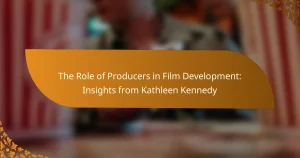
What is the significance of Hans Zimmer’s music in film scores?
Hans Zimmer’s music is significant in film scores due to its emotional depth and innovative sound design. His compositions often enhance storytelling by evoking specific feelings. Zimmer frequently blends orchestral and electronic elements, creating unique soundscapes. This fusion allows for a modern approach to traditional film scoring. His scores have shaped the sound of contemporary cinema, influencing other composers. Films like “Inception” and “The Lion King” showcase his ability to create memorable themes. Zimmer’s work has earned numerous awards, including Academy Awards and Grammys. His influence on film music continues to resonate across various genres and styles.
How has Hans Zimmer influenced the film music landscape?
Hans Zimmer has significantly influenced the film music landscape through innovative scoring techniques. He revolutionized the use of synthesizers and orchestral elements in film scores. His work on films like “The Lion King” won him an Academy Award, showcasing his ability to blend genres. Zimmer popularized the concept of thematic consistency across a film’s score. He often collaborates with directors, enhancing the storytelling through music. His scores for “Inception” and “Interstellar” introduced complex soundscapes that shaped modern cinematic sound. Zimmer’s influence extends to inspiring a new generation of composers in the industry. His signature style emphasizes emotional resonance and dynamic range in film music.
What are the key elements of Zimmer’s musical style?
Hans Zimmer’s musical style is characterized by a blend of orchestral and electronic elements. He often incorporates rich harmonies and layered textures. Zimmer utilizes innovative sound design techniques to create unique auditory experiences. His scores frequently feature powerful motifs that enhance emotional depth. He is known for using unconventional instruments alongside traditional orchestral ones. Collaboration with other artists and musicians is a hallmark of his approach. Zimmer’s music often emphasizes rhythm and percussion to drive the narrative. His ability to adapt styles to fit various genres distinguishes his work in film scoring.
How do his compositions differ from traditional film scores?
Hans Zimmer’s compositions differ from traditional film scores by utilizing innovative sound design and blending various musical styles. He often incorporates electronic elements alongside orchestral arrangements. This creates a unique sonic texture that traditional scores may not explore. Zimmer also emphasizes emotional depth through minimalistic motifs. His approach often involves collaboration with other artists and sound designers, enhancing the overall composition. For example, in “Inception,” he uses the concept of “shepard tones” to create an auditory illusion of a never-ending ascent. This technique is less common in traditional scoring. Overall, Zimmer’s work challenges conventional scoring by prioritizing atmosphere and emotional resonance over thematic development.
Why is Hans Zimmer considered a pioneer in film scoring?
Hans Zimmer is considered a pioneer in film scoring due to his innovative approach and integration of technology. He revolutionized the use of synthesizers alongside traditional orchestration. Zimmer’s scores often blend electronic elements with orchestral sounds, creating unique auditory experiences. His work on films like “The Lion King” and “Inception” showcases this fusion effectively. He has also collaborated with various directors, enhancing the emotional depth of their films. Zimmer’s ability to adapt and evolve with the changing landscape of film music sets him apart. His influence is evident in the works of contemporary composers who follow his techniques. This combination of creativity and technical expertise solidifies his status as a pioneer in the industry.
What innovations has Zimmer introduced to film music?
Hans Zimmer has introduced several innovations to film music. He is known for blending orchestral and electronic elements. This fusion creates a unique sound that enhances emotional depth. Zimmer often collaborates with sound designers to develop new textures. He utilizes unconventional instruments to achieve distinctive auditory experiences. His approach to thematic development is also noteworthy. Zimmer crafts motifs that evolve throughout a film. This technique allows for deeper character and narrative connections. His work on films like “Inception” and “Interstellar” exemplifies these innovations. These scores have redefined expectations for modern film music.
How has Zimmer’s background shaped his approach to film scores?
Hans Zimmer’s background has significantly influenced his approach to film scores. Born in Germany, Zimmer was exposed to diverse musical styles early in life. He studied classical music and later embraced electronic music. This blend allows him to merge orchestral and synthetic sounds seamlessly. His experience in various genres informs his innovative scoring techniques. Zimmer’s collaboration with directors enhances his understanding of narrative and emotional depth. He often incorporates cultural elements into his scores, reflecting his global influences. This unique background enables him to create memorable and impactful soundtracks that resonate with audiences.
What are the most notable film scores composed by Hans Zimmer?
The most notable film scores composed by Hans Zimmer include “The Lion King,” “Gladiator,” “Inception,” and “Interstellar.” “The Lion King,” released in 1994, won an Academy Award for Best Original Score. “Gladiator,” released in 2000, received critical acclaim and won a Grammy Award. “Inception,” released in 2010, is known for its innovative use of sound design and orchestration. “Interstellar,” released in 2014, features an emotional and atmospheric score that enhances the film’s narrative. Each of these scores showcases Zimmer’s unique ability to blend orchestral and electronic elements, making them iconic in cinema history.
Which films showcase Zimmer’s unique scoring techniques?
Films that showcase Hans Zimmer’s unique scoring techniques include “Inception,” “The Dark Knight,” and “Interstellar.” In “Inception,” Zimmer employs a distinctive use of time manipulation in the score. The iconic “braaam” sound is a hallmark of his technique. “The Dark Knight” features a blend of orchestral and electronic elements, creating tension. Zimmer’s collaboration with director Christopher Nolan is evident in this film. In “Interstellar,” he uses organ music to evoke emotion and vastness of space. Each score reflects Zimmer’s innovative approach to blending traditional orchestration with modern sound design.
What themes are prevalent in Zimmer’s most acclaimed works?
Hans Zimmer’s most acclaimed works often explore themes of heroism, conflict, and emotional depth. His scores frequently reflect the journey of characters, emphasizing their struggles and triumphs. For instance, in “Gladiator,” Zimmer captures the themes of honor and vengeance through powerful orchestration. In “Inception,” he delves into the complexities of dreams and reality, creating a sense of tension and urgency. The theme of love and loss is prevalent in “The Lion King,” where music enhances the emotional narrative. Zimmer’s ability to blend orchestral and electronic elements also showcases innovation in storytelling through sound. His scores often evoke a strong sense of place, immersing the audience in the film’s world. Overall, Zimmer’s thematic focus enhances the cinematic experience, making his music integral to the films he scores.
How does Hans Zimmer collaborate with filmmakers and other artists?
Hans Zimmer collaborates with filmmakers and other artists through open communication and creative brainstorming. He engages in discussions to understand the vision of the film. Zimmer often shares ideas and concepts with directors to align musical themes with visual storytelling. He utilizes technology to create and modify compositions collaboratively. Zimmer frequently works with other musicians and sound designers to enhance the score. His collaboration process includes feedback loops, allowing for adjustments based on the filmmakers’ responses. This approach has led to successful partnerships, exemplified by his work with directors like Christopher Nolan and Ridley Scott. Their collaborations have resulted in iconic scores that are integral to the films’ emotional impact.
What role does collaboration play in Zimmer’s creative process?
Collaboration is central to Hans Zimmer’s creative process. Zimmer often works with other composers, musicians, and directors. This teamwork enhances the depth and richness of his scores. Collaboration allows for diverse perspectives and ideas to shape the music. Zimmer believes that sharing creativity leads to innovative soundscapes. He frequently collaborates with notable artists like Lisa Gerrard and Pharrell Williams. Such partnerships have resulted in iconic film scores. For example, his work on “Gladiator” with Gerrard exemplifies this synergy. Overall, collaboration amplifies Zimmer’s ability to create compelling and memorable music.
How do these collaborations enhance the emotional impact of his scores?
Collaborations enhance the emotional impact of Hans Zimmer’s scores by integrating diverse artistic perspectives. These partnerships often involve vocalists, instrumentalists, and other composers. Each collaborator contributes unique emotional nuances to the music. For instance, working with renowned artists like Lisa Gerrard introduces haunting vocal elements. This adds depth and resonance to the score, enhancing its overall emotional landscape. Additionally, collaborations with directors shape the music to fit specific narrative arcs. This alignment between visuals and sound amplifies audience engagement. Research shows that collaborative scores result in richer emotional experiences for viewers. Zimmer’s collaborative approach has led to critically acclaimed soundtracks in films like “Gladiator” and “Inception.”
What impact has Hans Zimmer’s music had on audiences and the film industry?
Hans Zimmer’s music has profoundly influenced audiences and the film industry. His scores evoke deep emotional responses, enhancing the storytelling experience. Zimmer’s innovative use of electronic and orchestral elements has redefined film scoring. He has created iconic themes for films like “Inception” and “The Lion King.” These compositions have become cultural touchstones, recognized even outside the cinema. Zimmer’s work has also inspired a new generation of composers. His approach emphasizes collaboration with filmmakers, shaping the overall narrative. The impact of his music is evident in numerous awards, including Academy Awards and Grammy Awards.
How does Zimmer’s music contribute to storytelling in films?
Zimmer’s music enhances storytelling in films by evoking emotions and setting the tone. His compositions often reflect the character’s journey and the film’s themes. For example, in “The Lion King,” the score underscores Simba’s growth and struggles. In “Inception,” Zimmer uses layered sounds to create tension and complexity. His use of motifs connects characters and events, enriching the narrative. The emotional depth in his scores often resonates with audiences, making scenes more impactful. Zimmer’s innovative techniques, like blending orchestral and electronic elements, push the boundaries of traditional film scoring. This fusion creates a unique auditory experience that complements the visual storytelling.
What emotional responses does Zimmer’s music evoke in viewers?
Zimmer’s music evokes a range of emotional responses in viewers, including excitement, nostalgia, and tension. His compositions often create a sense of grandeur and epic scale, enhancing the cinematic experience. For instance, the score for “Inception” induces feelings of suspense and urgency. In contrast, the music from “The Lion King” evokes nostalgia and warmth, connecting viewers to their childhood. Additionally, his use of themes and motifs can trigger deep emotional resonance, making viewers feel empathy for characters. Studies show that music significantly influences emotional perception in film, reinforcing the impact of Zimmer’s scores. Thus, his work is essential in shaping the audience’s emotional journey throughout films.
What are some best practices for analyzing Hans Zimmer’s film scores?
To analyze Hans Zimmer’s film scores effectively, focus on thematic elements, instrumentation, and emotional impact. Begin by identifying recurring motifs within his scores. Zimmer often uses specific themes to represent characters or ideas. Next, examine the instrumentation choices he makes. He blends orchestral and electronic elements to create unique soundscapes. Pay attention to how these choices enhance the narrative. Analyze the emotional arc of the score. Zimmer’s music often mirrors character development and plot progression. Consider the context of the film and how the score interacts with visual storytelling. Lastly, listen to the scores multiple times to grasp nuances. This approach allows for a deeper understanding of his compositional style and intent.
How can one effectively listen to and appreciate Zimmer’s compositions?
To effectively listen to and appreciate Zimmer’s compositions, one should focus on the emotional journey they evoke. Zimmer’s scores often blend orchestral elements with electronic sounds. Paying attention to these layers enhances understanding. Listening in a quiet environment allows for deeper immersion. Engaging with the narrative context of the film can enrich the experience. Noticing recurring motifs throughout his works reveals thematic depth. Analyzing the instrumentation used can highlight unique soundscapes. Exploring live performances can provide a different perspective on his music. Zimmer’s compositions are designed to elicit strong emotional responses, making active listening crucial.
What resources are available for studying Zimmer’s musical techniques?
Resources for studying Hans Zimmer’s musical techniques include books, online courses, and documentaries. Notable books include “The Art of Film Music” by David Stevenson, which discusses Zimmer’s contributions. Online platforms like MasterClass offer courses specifically on film scoring by Zimmer. Documentaries such as “Score: A Film Music Documentary” feature insights into his methods. Additionally, Zimmer’s official website provides access to interviews and behind-the-scenes content detailing his creative process. These resources provide a comprehensive understanding of his unique techniques in film scoring.
The main entity of this article is composer Hans Zimmer and his significant contributions to film scores. The article explores Zimmer’s innovative blending of orchestral and electronic elements, which enhances storytelling and evokes emotional depth in films. It discusses his unique scoring techniques, notable works like “Inception” and “The Lion King,” and the impact of his music on audiences and the film industry. Additionally, the article highlights Zimmer’s collaboration with filmmakers, his thematic focus, and best practices for analyzing his compositions.


